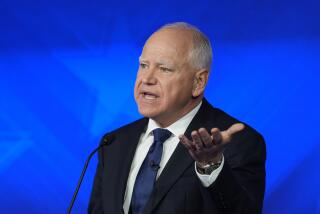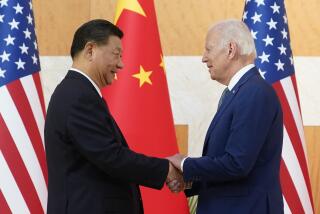As Polite Gore Bows Out, Gingrich Enters the Ring in China--Swinging
- Share via
BEIJING — And now for the main event.
As Vice President Al Gore prepared to leave China after a polite visit reflecting the Clinton administration’s policy of “constructive engagement” with the world’s most populous country, House Speaker Newt Gingrich entered the ring with his gloves off.
Gingrich, who arrived here Thursday night, set the tone for his three-day sortie into China with a speech delivered earlier in the day in Hong Kong, vowing that he will not “remain silent about the lack of basic freedom--speech, religion, assembly, the press--in China.”
His visit promises to be much more contentious than Gore’s, and for many in the Chinese leadership it is more important. It was the Republican Party sweep of Congress in 1994 and Gingrich’s elevation to the speaker’s post that most upset China’s conventional wisdom about American politics. The downward spiral of Sino-U.S. relations that began then culminated in the military standoff in the Taiwan Strait last spring.
Until the landmark 1994 elections, the Chinese leadership had viewed the Republicans as allies who cared more about business and geopolitical realities than about human rights. Even after the debacle of Watergate and his forced resignation, Richard Nixon remained a hero in China for taking the lead in normalizing relations.
After China’s 1989 army crackdown in Tiananmen Square, Republican President George Bush, who served as one of the United States’ first envoys to the People’s Republic, urged calm while the Democrats, including emerging presidential candidate Bill Clinton, decried the Chinese leadership as the “butchers of Beijing.”
The sides essentially reversed in the 1994 elections. After his succession to the speakership, Gingrich startled the Beijing regime by calling for the admission of Taiwan to the United Nations, a position that undermined the Nixon doctrine of “one China.” He lambasted the Chinese government’s restrictive religious policies, heaped praise on the incipient Taiwanese democracy and invited Taiwan’s president, Lee Teng-hui, to speak before a joint session of Congress.
Under the tutelage of former Secretary of State Henry A. Kissinger, architect of the “one China” policy, Gingrich later backed off his more extreme positions, including support for Taiwan’s U.N. candidacy. But since the 1994 congressional elections, getting Gingrich to China has been one of the main goals of the Beijing leadership.
Gingrich finally came calling on Thursday, arriving here at the head of a bipartisan, 12-member congressional delegation. During his stay, Gingrich is to meet with President Jiang Zemin, Premier Li Peng and with his host and counterpart in the Chinese leadership, National People’s Congress Chairman Qiao Shi.
Among other activities, the Georgia Republican is to deliver a speech on Sino-U.S. relations at the Institute of International Relations, visit the Great Wall, meet with directors of the country’s experimental village democracy project and--reflecting his passion for zoology--tour Beijing’s Natural History Museum.
His China trip concludes in Shanghai, where he plans to attend Easter services at one of the city’s state-administered churches. Perhaps anticipating that event, Gingrich filled his speech Thursday before the American Chamber of Commerce in Hong Kong with religious references and included his pledge to confront Chinese authorities here.
“As Americans,” Gingrich said, “we take seriously a country’s commitment to human rights. We cannot look the other way when the People’s Republic of China ignores Article 35 of its constitution by depriving a citizen of his free speech; we cannot disregard its failure to uphold Article 36 of its own constitution every time it denies the free exercise of religion.”
More to Read
Get the L.A. Times Politics newsletter
Deeply reported insights into legislation, politics and policy from Sacramento, Washington and beyond. In your inbox twice per week.
You may occasionally receive promotional content from the Los Angeles Times.









